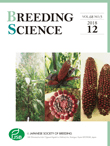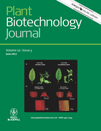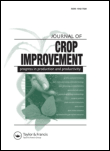
GENETIC RESOURCES AND CROP EVOLUTION
Scope & Guideline
Pioneering Research in Genetic Resources for Future Harvests
Introduction
Aims and Scopes
- Genetic Diversity Assessment:
A core focus of the journal is the evaluation of genetic diversity within various plant species, which is essential for conservation and breeding programs. This includes the use of molecular markers such as SSRs, SNPs, and ISSRs to analyze genetic variation. - Crop Improvement and Breeding:
The journal emphasizes research on crop improvement techniques, including traditional breeding methods and modern genomic approaches, to enhance desirable traits such as yield, disease resistance, and stress tolerance. - Conservation Strategies:
Research aimed at developing strategies for in situ and ex situ conservation of genetic resources is a significant theme. This includes studies on crop wild relatives and endangered species, highlighting the importance of preserving genetic diversity. - Phylogenetic and Taxonomic Studies:
The journal publishes work on the phylogenetic relationships among plant species, which helps in understanding their evolutionary history and informing conservation strategies. - Utilization of Underutilized Crops:
A unique contribution of the journal is its focus on underutilized and neglected crops, exploring their genetic diversity and potential for sustainable agriculture and food security. - Ethnobotany and Traditional Knowledge:
The integration of ethnobotanical knowledge into genetic resource studies is highlighted, emphasizing the importance of traditional practices in the conservation and utilization of plant genetic resources.
Trending and Emerging
- Genomic Approaches to Understanding Genetic Diversity:
There is an increasing trend towards the use of genomic technologies, such as whole-genome sequencing and genome-wide association studies (GWAS), to understand genetic diversity and its implications for crop improvement. - Focus on Climate Resilience:
Research exploring the genetic basis of climate resilience in crops, including stress tolerance traits (e.g., drought, heat, and salinity), is gaining traction, reflecting the urgent need for climate adaptation in agriculture. - Integration of Ethnobotany with Genetic Studies:
Emerging themes include the integration of ethnobotanical knowledge with genetic research, emphasizing the importance of traditional knowledge in conservation and utilization of genetic resources. - Biotechnological Innovations in Crop Improvement:
There is a noticeable rise in studies utilizing biotechnological innovations, such as CRISPR and other gene editing technologies, for enhancing crop traits and addressing agricultural challenges. - Sustainable Agricultural Practices:
Research focusing on sustainable agricultural practices, including the use of underutilized crops and traditional varieties, is becoming more prominent, aligning with global sustainability goals.
Declining or Waning
- Traditional Breeding Techniques:
There is a noticeable decline in publications focusing solely on traditional breeding techniques without integration of molecular approaches. This suggests a shift towards more advanced genetic tools and technologies in crop improvement. - General Agronomy Studies:
Research that deals broadly with agronomy without a genetic or molecular component has decreased, indicating a trend towards more specialized studies that focus on genetic diversity and molecular genetics. - Morphological Studies Without Molecular Correlation:
The number of studies focusing exclusively on morphological characteristics without correlating them with genetic data is waning. This reflects a growing emphasis on comprehensive approaches that integrate both morphological and molecular analyses.
Similar Journals

Crop Breeding and Applied Biotechnology
Driving progress in agronomy with impactful research contributions.Crop Breeding and Applied Biotechnology is a prominent open-access journal published by the Brazilian Society of Plant Breeding that has been dedicated to advancing research in the fields of Agronomy, Crop Science, and Biotechnology since its inception in 2001. With an ISSN of 1984-7033 and an E-ISSN of 1518-7853, this journal is widely recognized within the academic community, evidenced by its Q2 ranking in Agronomy and Crop Science and Q3 ranking in Biotechnology for 2023. The journal serves as a vital platform for researchers, professionals, and students, facilitating the exchange of innovative ideas and studies in crop breeding techniques, genetic improvements, and applied biotechnological advancements. Housed at the Federal University of Viçosa, Brazil, it not only enhances global collaboration among scientists but also contributes to the sustainable development of agricultural practices. As a peer-reviewed journal with a significant indexing presence, it ensures high visibility and accessibility of quality research to the global scientific community.

Crop Journal
Connecting global minds for a sustainable agricultural future.Crop Journal (ISSN: 2095-5421; E-ISSN: 2214-5141) is a premier, open access journal published by KEAI PUBLISHING LTD, dedicated to advancing the fields of agronomy and plant science. Established in 2013, this journal has quickly established itself as a vital resource for researchers, professionals, and students, achieving a remarkable Q1 ranking in both Agronomy and Crop Science, as well as Plant Science. With an impressive position in the Scopus rankings—30th out of 516 in Plant Science and 25th out of 406 in Agronomy—it stands at the forefront of scholarly discourse, representing the latest innovations and research breakthroughs within the global agricultural community. The journal embraces a broad scope that encompasses all aspects of crop science, aiming to foster understanding and propel advancements in sustainable agricultural practices. Accessible from anywhere in the world, Crop Journal plays a crucial role in disseminating knowledge that addresses the challenges of food security and environmental sustainability, making it an indispensable tool for those invested in the future of our planet's agriculture.

Pesquisa Agropecuaria Tropical
Exploring the forefront of agronomic research.pesquisa Agropecuaria Tropical is a premier Open Access journal dedicated to advancing the knowledge and practices within the field of agronomy and crop science. Since its inception in 1971, this peer-reviewed journal, published by the Universidade Federal de Goiás, has played a pivotal role in disseminating high-quality research from Brazil and beyond. Operating under an Open Access model, it ensures that scholarly articles are freely accessible, thereby fostering greater collaboration and innovation. With a Scopus ranking placing it in the 32nd percentile among its peers in agricultural and biological sciences, and a current classification in the Q3 category of agronomy and crop science, the journal serves as an essential resource for researchers, professionals, and students alike. As it continues its publication journey from 2010 to 2024, it remains committed to contributing valuable insights and advancements in the agricultural sector, ultimately influencing sustainable practices and food security.

BREEDING SCIENCE
Advancing the Future of Agronomy and GeneticsBREEDING SCIENCE is a premier journal published by the Japanese Society of Breeding, dedicated to the advancement of knowledge in the disciplines of agronomy, plant science, and genetics. Established in 1993, this influential publication has consistently contributed to the global research community, showcasing high-quality studies that intersect innovative breeding techniques with pressing agricultural challenges. With an esteemed Scopus rank placing it in the top quartile of Agronomy and Crop Science and the second quartile in Plant Science, BREEDING SCIENCE is essential reading for researchers, professionals, and students alike. The journal's reach and rigor are evidenced by its significant presence in leading academic databases, providing insights and advancements that are critical for improved crop production and sustainable practices. Although it does not currently offer open access options, the depth and relevance of its content ensure that it remains a vital resource for those committed to exploring the evolution and impact of breeding science. For further information, readers are encouraged to connect directly with the journal via its administrative office located at the University of Tokyo's Graduate School of Agricultural and Life Sciences.

JOURNAL OF GENETICS
A Legacy of Excellence in Genetic ScholarshipJOURNAL OF GENETICS, published by the Indian Academy of Sciences, is a pivotal platform for researchers and scholars in the field of genetics. With its long-standing history dating back to 1910, this journal has consistently contributed to the academic discourse through the rigorous publication of original research, reviews, and case studies. Despite its current classification in the Q4 quartile for the 2023 metrics in Genetics, the journal plays a critical role in advancing our understanding of genetic principles, experimental methodologies, and innovations. Spanning a diverse array of topics, the journal aims to foster scholarly exchange and collaboration within the global genetics community. For researchers aiming to publish their work, accessing the journal’s comprehensive archives, which include publications from as early as 1910 to the present day, offers a valuable perspective on the evolution of genetic research. As it continues to adapt to the changing landscape of scientific inquiry, JOURNAL OF GENETICS remains a significant resource for students, professionals, and academics dedicated to exploring the complexities of genetics.

Vavilovskii Zhurnal Genetiki i Selektsii
Exploring New Horizons in Agricultural GeneticsVavilovskii Zhurnal Genetiki i Selektsii, with ISSN 2500-0462 and E-ISSN 2500-3259, is a distinguished open-access journal published by the Russian Academy of Sciences, Institute of Cytology and Genetics. Since transitioning to open access in 2013, the journal has been dedicated to advancing research and discourse in the fields of genetics and selection, particularly within agricultural and biological sciences. With a current ranking of Q2 in Agricultural and Biological Sciences and Q3 in Biochemistry, Genetics and Molecular Biology according to Scopus, it serves as a pivotal platform for researchers, professionals, and students to disseminate their findings and collaborate on innovative ideas. The journal, housed in the vibrant academic environment of Novosibirsk, Russia, publishes a diverse range of articles that contribute to the ongoing evolution of genetic studies and practical applications in agriculture. Its commitment to quality and accessibility ensures it plays an essential role in the global scientific community, fostering knowledge that bridges theoretical research and practical implementation.

PLANT BIOTECHNOLOGY JOURNAL
Catalyzing breakthroughs in agricultural biotechnology.Plant Biotechnology Journal, published by Wiley, is a premier open-access platform dedicated to advancing the field of plant biotechnology. Since its inception in 2003, this journal has played a pivotal role in disseminating high-quality research that enhances our understanding of plant genomics, biochemistry, and molecular biology. With an impressive impact factor and a prominent position in Q1 quartiles across Agronomy, Crop Science, Biotechnology, and Plant Science, it ranks among the top journals globally, reflecting its significant influence in the agricultural and biological sciences. Researchers and professionals can access cutting-edge studies and reviews that facilitate innovation in sustainable crop production and biotechnology applications. The journal's transition to an open access model since 2016 has further amplified its reach, ensuring that vital research is available to a global audience, promoting collaboration and knowledge sharing within the scientific community.

Revista Caatinga
Unlocking Insights for Global Agricultural ChallengesRevista Caatinga is a premier open-access journal published by Universidade Federal Rural do Semi-Árido (UFERSA), dedicated to the dissemination of significant research within the field of Agricultural and Biological Sciences. Since its inception in 2006, the journal has aimed to bridge the knowledge gap in various aspects of agricultural practices and biological phenomena, making vital contributions to the scientific community. With its publications indexed in Scopus and holding an impressive Q2 categorization in the competitive landscape of agricultural sciences, the journal ranks within the top half of its category (100/221), demonstrating a commitment to quality scholarship. The journal is based in Brazil and covers a wide array of topics relevant to both local and global agricultural challenges. By fostering open access, Revista Caatinga ensures that vital research is available to a broad audience, promoting knowledge sharing and collaboration among researchers, practitioners, and students around the world.

PLANTA
Transforming knowledge into groundbreaking discoveries.PLANTA, published by SPRINGER, stands as a pivotal journal in the field of plant sciences and genetics, known for its rigorous peer-reviewed research that has influenced the advancement of botanical science since its inception in 1925. With an impressive trajectory of convergence from the years 1925 to 1945, and again from 1947 to 2024, this journal maintains a strong reputation, currently categorized in the prestigious Q1 tier of Plant Science and Q2 tier in Genetics as of 2023. The journal is recognized for its high impact, ranked #64 out of 516 in Plant Science by Scopus, representing the top 87th percentile within its category, while also securing a strong position in Genetics with a #92 rank. The journal serves as a critical resource for researchers, professionals, and students who are eager to explore the complex genetics, biochemistry, and evolutionary biology of plants. Though primarily subscription-based, the quality of the research published in PLANTA makes it an essential reading for anyone serious about advancing their knowledge and understanding of plant sciences.

Journal of Crop Improvement
Advancing agricultural excellence through innovative research.The Journal of Crop Improvement, published by Taylor & Francis Inc, is an esteemed platform dedicated to advancing the field of agronomy and crop science. With an ISSN of 1542-7528 and an E-ISSN of 1542-7536, this journal boasts a commendable reputation, reflected in its 2023 quartile rankings—notably, Q2 in Agronomy and Crop Science and Q2 in Plant Science, positioning it among the leading publications within its category. The journal encompasses a wide range of topics related to crop enhancement, sustainable agriculture, and genetic advancements, catering to the needs of researchers, industry professionals, and students alike. Although it currently does not provide open access, the Journal of Crop Improvement plays a crucial role in disseminating pioneering research aimed at improving crop resilience, yield, and quality. By maintaining a focus on innovative studies and empirical findings, the journal supports the global agricultural community in addressing the challenges posed by climate change and food security.